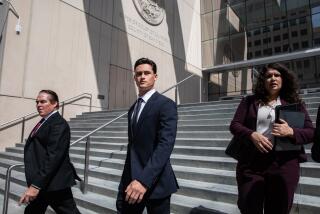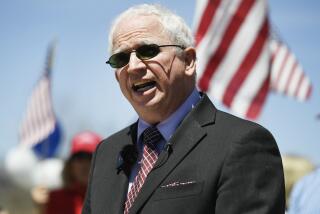Cox Attorneys May See est Videotapes, Commissioner Says
- Share via
Est founder Werner Erhard was ordered Friday to turn over training videotapes to attorneys for Congressman-elect C. Christopher Cox (R-Newport Beach), who is trying to prove that his campaign didn’t slander Erhard when it called est a “cult.”
Campaign workers for Cox, who defeated Erhard’s brother, Newport Beach businessman Nathan Rosenberg, in this year’s battle for the Republican nomination in the 40th District, asked voters whether they would vote for a candidate associated with “that cult est.” The district includes Newport Beach, Laguna Beach, Irvine and Costa Mesa.
Cox maintains that the tapes could affirm his description of est as a cult. Erhard ran the est self-awareness program until he shut it down in 1984 and started a successor program.
Cox’s attorneys sought access to videotapes of self-awareness training programs in an attempt to show that Cox’s description of the group as a cult was fair and not slanderous. The videotapes show paying participants in est training sessions.
“They seem significant,” Cox attorney Sue Himmelrich said of the tapes, although she would not specify what evidence the attorneys will be seeking.
Attorneys for Erhard & Associates, a San Francisco-based firm that runs human potential seminars, fought to protect the tapes on the grounds that they are irrelevant to the slander suit and could compromise the privacy of the participants.
But Superior Court Commissioner Eleanor M. Palk in Santa Ana disagreed and on Friday ordered Erhard to turn over 60 hours of the most recent videotapes that Cox’s attorneys requested. The tapes are “for attorneys’ eyes only,” meaning that Cox himself will be barred from looking at them to help protect the participants’ privacy.
The order is the second recent courtroom victory for Cox. Ten days ago, Palk threw out the portion of Erhard’s complaint alleging that Cox had libeled him by labeling est “a destructive cult” in campaign mailers. Palk ruled that the mailers were protected speech because they were easily identifiable as a political statement.
That ruling left intact the slander portion of Erhard’s claim. Phone calls by campaign workers were not so readily recognizable to voters as political opinion, Palk reasoned.
Himmelrich said Cox’s attorneys, even while gaining access to the disputed videotapes, are still exploring an offer made by Erhard to settle the slander suit out of court.
More to Read
Sign up for Essential California
The most important California stories and recommendations in your inbox every morning.
You may occasionally receive promotional content from the Los Angeles Times.













